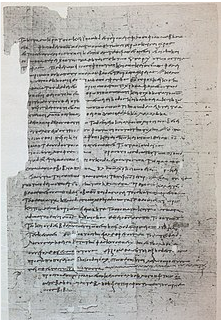The True Word (partially lost anti-Christian treatise; 2nd Century AD)
The True Word (Alēthēs logos in Greek[1]) is a partially lost treatise written by the Greek philosopher Celsus during the 2nd century AD. It is notable for the oldest known major criticism of Christianity.[2] The only surviving fragments of this work can be found in a 3rd century rebuttable, Contra Celsum (Against Celsus), written by the Christian apologist, Origen of Alexandria[3]. It is through Origen's rebuttable scholars have attempted to reconstruct the original text and message of The True Word.[4]
Authorship and Dating
In his response Origen identified the author of The True Word, Celsus, as an epicureanism philosopher[5] who lived during the reign of the Roman Emperor Hadrian (117-138AD)[6]. Many modern scholars disagree with Origen's assessments however and argue Celsus's writings reflect eclecticism rather than epicureanism, and his knowledge of certain Gnostic sects likely places his writings in the mid to later half of the second century[7].
Contents
From what can be reconstructed from Origen's response Celsus framed the first two books of his treatise from the point of view of a Jew questioning Jesus and his fellow Jews who had decided to follow Jesus, the latter six books were written from Celsus's own point of view[8]. Celsus seemed to view Judaism and Christianity contemptibly as religions of slaves and lower class individuals[9] and attacked Christianity in a variety of ways. Celsus called out many of Christianity's miraculous and supernatural stories as being boring and unoriginal, believing many of these stories were poorly plagiarized from earlier Greek mythology.[10]. Celsus went on to question many Christian doctrines such as the virgin birth, end times theology, and Jesus's fulfillment of messianic prophecies[11]. Additionally Celsus went on to attack the monotheistic idea of an all knowing and all powerful God, questioning why such a deity would allow evil and Satan to exist[12].
Beyond just theological attacks Celsus, an admirer of Plato,[13] thought Christianity was, in contrast to Plato, anti intellectual,[14] and threat to the existing pagan Roman society that could destabilize the current order.[15] Celsus was worried with how the Christian's conducted themselves in secrecy,[16] and thought that their rapid growth and refusal to swear allegiance to Roman Gods meant they could rebel against the Empire/[17]
Panthera Theory
In additional to his attacks against Christianity Celsus's work is also notable for being possibly the oldest known mention of the "Panthera Theory".[18] The Panthera Theory refers to the idea that Jesus was not born of a virgin but was rather conceived through adultery by Mary with a Roman soldier named Panthera. Regarding this Celsus wrote, "when she was pregnant she was turned out of doors by the carpenter to whom she had been betrothed, as having been guilty of adultery, and that she bore a child to a certain soldier named Panthera".[19] This idea would be repeated a few decades later by Jesus's critics in the Talmud,[20] who referred to him as "Jesus Ben Pantera" (Jesus son of Pantera), suggesting this was had become a common attack against Christianity by early third century. Rather or not Celsus invented the Panthera Theory or was merely repeating it from an earlier is unknown, as his full work has been lost it is impossible to know what sources, if any, he cited for this. And the Panthera Theory remains a fringe theory remains largely outside of the academic consensus.[21]
Christian Response
A large scale rebuttable to The True Word called Contra Celsum was written by the Christian apologist Origen of Alexandria in or around 248AD,[22] at the urging of his wealthy Christian friend, Ambrose.[23] Origen, who systematically went through and responded paragraph by paragraph to Celsus's work,[24] was an admirer of Plato, like Celsus,[25] and took offense to Celsus's charge that Christianity was anti-intellectual and argued that rational philosophy had a place in Christianity.[26] Origen's work would go on to become heavily influential in Christian apologetic[27] and would help elevate Christianity's academic respectability.[28]
Following the Empire's conversion to Christianity The True Word along with several other anti-Christian works were condemned by Emperor Valentinian III in 448AD.[29]
External Links
- The Surviving Fragments of The True Word (as quoted by Origen) can be found here
- Origen's response Contra Celsum can be found here
References
- ↑ https://archive.is/AkcPz
- ↑ https://archive.is/OUIpV
- ↑ https://archive.is/xxnGP
- ↑ https://archive.is/xxnGP
- ↑ https://archive.is/AZvIv
- ↑ https://archive.is/AZvIv
- ↑ https://archive.is/xxnGP
- ↑ https://archive.is/xxnGP
- ↑ https://archive.is/xxnGP
- ↑ https://archive.is/U3nQD
- ↑ https://archive.is/U3nQD
- ↑ https://archive.is/Qv1sF
- ↑ https://archive.is/JKCuC
- ↑ https://archive.is/MDpox
- ↑ https://archive.is/YgvLg
- ↑ https://archive.is/Qv1sF
- ↑ https://archive.is/z9eJj
- ↑ https://archive.is/vnt5G
- ↑ https://archive.is/Qv1sF
- ↑ https://archive.is/yKFfV
- ↑ https://archive.is/VSbBr
- ↑ https://archive.is/MDpox
- ↑ https://archive.is/MDpox
- ↑ https://archive.is/MDpox
- ↑ https://archive.is/MDpox
- ↑ https://archive.is/MDpox
- ↑ https://archive.is/cm6Az
- ↑ https://archive.is/nF8rt
- ↑ https://archive.is/U3nQD
